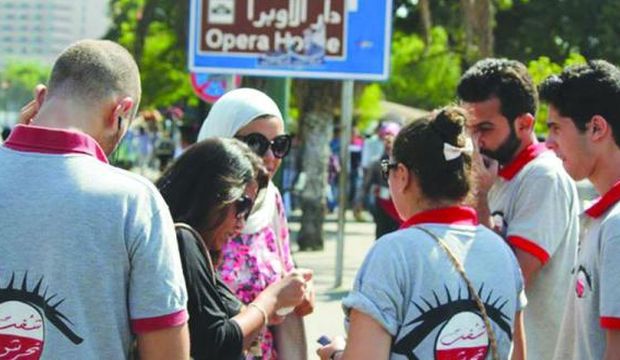
Members of the ‘I Saw Harassment’ NGO in Egypt gather in Cairo, Egypt during the Eid Al-Adha holiday, on October 4, 2014. (Courtesy of ‘I Saw Harassment’ Facebook page)
Cairo, Asharq Al-Awsat—Noor and Salma, two 15-year-old Egyptian girls, were flushed with happiness when a policewoman accompanied them through the crowded entrance of the Metro cinema in central Cairo on the first day of Eid Al-Adha. The female police officer is a member of a newly formed police unit tasked with protecting women against sexual harassment.
In a sight uncommon to the people of the country, members of the female police unit were deployed across the streets of Cairo and other Egyptian cities during the Eid festival. The initiative has attracted much public attention and has been widely welcomed by Egyptians weary of sexual harassment, a phenomenon that has grown rampant in the country in recent years. Asharq Al-Awsat tried to speak to one of the female police officers, but she politely declined since she cannot speak to the media without formal permission from her superiors.
The new initiative has not been without its challenges, however. It has already been reported on social media websites that several of the anti-harassment female personnel were themselves subjected to harassment during the Eid holiday; however, these incidents proved limited in most cases to verbal abuse and members of the public were quick to rush to the young policewomen’s rescue.
“The deployment of a trained female police force comes within the framework of . . . of confronting all negative phenomena against women in the country,” Deputy Minister of Interior for Human Rights Maj. Gen. Abu Bakr Abdelkarim tells Asharq Al-Awsat.
The initiative, Abdelkarim says, has led to a “significant and marked decline in harassment cases this year, with [the majority] being limited to verbal abuse only.”
This marks a significant step from previous reports of physical violations and violent attacks being committed against women, including instances of group harassment.
Over the past few years, many Egyptian women have fallen victim to sexual harassment, both verbal and physical, with the majority of incidents taking place during protests and the Eid holidays. In a study issued in 2013, the UN said almost 99 percent of Egyptian women had been subjected to some form of sexual harassment.
But the government has finally begun to act. Egypt’s judiciary approved a legal amendment in June penalizing harassers with at least six months’ imprisonment or a 3,000-Egyptian-pound (420-US-dollar) fine. Under the new law, many have already been sentenced to years in prison for sexually harassing women at the iconic Tahrir Square during celebrations marking the inauguration of President Abdel Fattah El-Sisi in May.
Abdelkarim says his ministry heavily deployed members of the new police force unit throughout all main streets during the Eid season last week, and when the new school year began last month.
Current members of the unit had served at different Ministry departments until July 2013, when Egypt’s Minister of Interior Mohamed Ibrahim issued a resolution establishing the department.
“As the phenomenon of harassment exacerbated and women were being subjected to sexual harassment, the interior minister established sections for fighting crimes of violence against women in all security directorates and embedded within them female police personnel,” he adds.
“The presence of policewomen is very significant in terms of dealing with girls and women in the street . . . They have played a positive and marked role and they succeeded in fighting harassment and arresting several young men for committing violence against women,” he says.
The Ministry’s plans this year have been extremely influential in reducing violence against women, and the heavy deployment of security forces played a significant role in limiting most recorded cases to verbal abuse.
With the proliferation of acts of group harassment, however, it has been difficult for female officers to be on their own on the streets, Abdelkarim says. As a result, the Ministry decided to employ male officers into the force as well. Abdelkarim says the unit will operate throughout the year and not only during public occasions, and that the ministry is currently coordinating with several voluntary groups to boost its performance.
